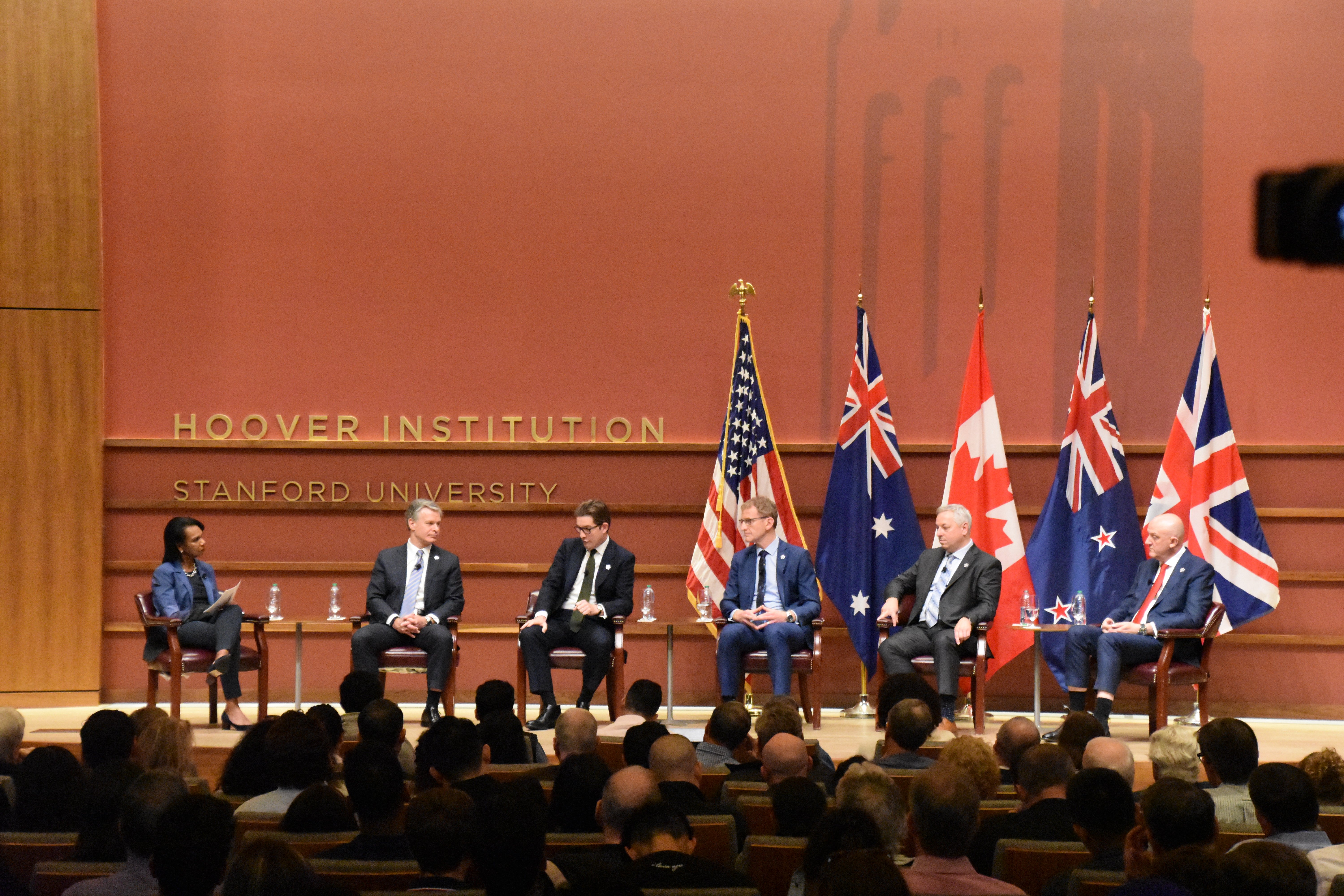Five global security intelligence leaders gathered at the Hoover Institution in their first public joint appearance ever on Tuesday. They addressed security threats to emerging technologies and the safeguarding of innovation and freedom at academic institutions.
The Five Eyes intelligence partners — a coalition of five countries dedicated to global security which includes Australia, the U.S., the United Kingdom, Canada and New Zealand — gathered for the panel.
“These gentlemen represent, if you will, the eyes and ears of democracy to protect ourselves,” said Condoleezza Rice, the former U.S. secretary of state and current director of the Hoover Institution. Rice jointly hosted the panel with Christopher Wray from the FBI, with whom she worked under the Bush administration.
More than 450 attendees attended the event, which kicked off the first Emerging Technology and Securing Innovation Security Summit in Palo Alto.
Along with characterizing the security of intellectual property produced in the private sector, the summit contextualized ongoing concerns of the security of innovation in the private sector — focusing particularly on the threat posed to universities.
The panel consisted of Mike Burgess, the Australian Security Intelligence Organisation (ASIO) director-general of security; Ken McCallum, the British Security Service (MI5) director general; David Vigneault, the Canadian Security Intelligence Service (CSIS) director and Andrew Hampton, the New Zealand Security Intelligence Service (NZSIS) director-general.
The panelists addressed the intelligence threats posed by the People’s Republic of China (PRC) and the scale and depth to which the PRC’s actions in the private sector may filter down to affect the security of research initiatives at universities.
“There is no greater threat to innovation than the Chinese government,” Wray said.
Wray described the challenge the PRC presents as one of “both scale and breadth.” In terms of scale, the PRC has a larger hacking program than every other nation combined, Wray said. Their human intelligence operations include not only spies, but also insiders recruited in businesses and institutions and “non-traditional collectors,” according to Wray.
When combined with their “seemingly innocuous” joint ventures and investments in the private sector, the PRC poses a threat the likes of which Wray said the United States has never faced before.
“I’m often asked, ‘Is this a New Cold War?’ I tell people ‘no: it’s harder,’” Rice said. “The Soviet Union was a military giant, but it was an economic and technological midget. This time around, we have a competitor and adversary who is technologically, militarily and economically likely to be our equal.”
Preventing the PRC’s attempts at “wholesale intellectual property theft” does not mean impeding their economic growth, Burgess said.
“China has a right to be prosperous,” Burgess said. “China has a right to innovate. We are not trying to stop any of that. We are not trying to contain that. My nation has benefited greatly from China’s rise.”
The speakers repeatedly emphasized the importance of not lumping the actions of the Chinese Communist Party (CCP) with Chinese people and Chinese Americans, many of whom feel they are targeted by the public as a result of their race.
“The threat we are talking about is the Chinese government, the Chinese Communist Party. It is not the Chinese people and it is sure as heck not Chinese Americans. In fact, an awful lot of the time the victims of the CCP’s efforts are Chinese Americans,” Wray said.
The Five Eyes also shared how each of their respective governments are attempting to strengthen relations between the private and public sectors.
Rice said one of the main criticisms of the government is that it is currently not fully exploiting emerging technologies in the private sector to safeguard democracy.
“In the U.K., the center of our approach is partnership. There’s a special part of MI5, the National Protective Security Authority, that looks to share guidance and advice with our private sector and our universities,” McCallum said. “It’s not a list of things that we sort of draw up in our own bunker in MI5. Those bits of guidance are co-created with people in the sectors to be pragmatic and workable.”
The FBI has set up office spaces across several universities, something Wray said would be “unthinkable” a decade ago. Yet, no such office has been established at Stanford “because it’s a very competitive institution,” Wray said, prompting laughter from the audience.
“If openness is the hallmark of democracies, then super-openness is a hallmark of universities,” Rice said, alluding to Stanford’s place as one of the world’s leading research institutions. According to Rice, this makes emerging threats to national security an especially relevant concern to Stanford.
She specifically referred to the emergence of synthetic biology and associate professor of bioengineering Drew Endy’s research, which is done in partnership with the Hoover Institution.
“If you think a pandemic right now looks bad, think about a pandemic that is actually tailored to a population and the like,” Rice said.
According to 2021 data on the degrees conferred at Stanford, 50% of Stanford students graduated with STEM degrees. “Stanford is a big part of the innovation ecosystem and has been for our entire history,” Rice said. “You need to be aware of how others might exploit that.”
“If you are working at the cutting edge of technology today, you might not be interested in geopolitics, but geopolitics is most definitely interested in you,” McCallum said.
A previous version of this article referred to the Hoover Institution as the Hoover Institute. The Daily regrets this error.
